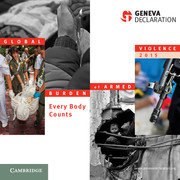Book contents
- Frontmatter
- Foreword
- Contents
- List of Illustrations
- About the Geneva Declaration
- Acknowledgements
- Executive Summary
- CHAPTER ONE Violence, Security, and the New Global Development Agenda
- CHAPTER TWO Lethal Violence Update
- CHAPTER THREE Lethal Violence against Women and Girls
- CHAPTER FOUR Unpacking Lethal Violence
- CHAPTER FIVE The Economic Cost of Homicide
Foreword
Published online by Cambridge University Press: 05 June 2015
- Frontmatter
- Foreword
- Contents
- List of Illustrations
- About the Geneva Declaration
- Acknowledgements
- Executive Summary
- CHAPTER ONE Violence, Security, and the New Global Development Agenda
- CHAPTER TWO Lethal Violence Update
- CHAPTER THREE Lethal Violence against Women and Girls
- CHAPTER FOUR Unpacking Lethal Violence
- CHAPTER FIVE The Economic Cost of Homicide
Summary
A safe life, without fear, is one of the most basic aspirations of the human being. It meets the immediate need of not having to fear for one's own life and physical integrity, which is also a fundamental human right. Unfortunately, the fear of being killed, general human insecurity, as well as high tolls of human life are the widespread realities of armed violence in countries affected by conflict, but also in non-conflict situations.
The Global Burden of Armed Violence 2015 report provides new evidence on the trends, patterns, and dynamics of lethal violence, in a wide array of contexts–within and outside conflict-affected settings. The availability of more comprehensive and detailed national-level data on lethal violence facilitates enhanced analysis which enables sustainable, lasting, and effective policy-making by various stakeholders at the national, regional, and global level.
This publication testifies that, in many countries around the world, violence is decreasing. This positive development is certainly encouraging. However, the report also finds that, in some locations, armed violence is on the rise. For instance, despite the efforts put in place by several governments and by civil society, the Latin American and Caribbean regions endure very high levels of violence. Further, new conflicts have fed the death toll dramatically. War in Syria and the crises in Libya and Ukraine have fuelled an increase of about one-third in direct conflict deaths. Over three million people have died altogether as a result of lethal violence in the period 2007–12. Statistics show that these casualties are concentrated in few countries, but it is our shared responsibility to tackle the root causes of violence and insecurity.
The publishing of the Global Burden of Armed Violence represents the main research contribution to the measurement pillar of the Geneva Declaration on Armed Violence and Development whose goal is to analyse and address the linkages between violence, security, and sustainable development. Since 2006 Switzerland has provided continuous political support to this goal, in different arenas, including the current negotiations on the new development agenda.
- Type
- Chapter
- Information
- Global Burden of Armed Violence 2015Every Body Counts, pp. iii - ivPublisher: Cambridge University PressPrint publication year: 2015
- 1
- Cited by



